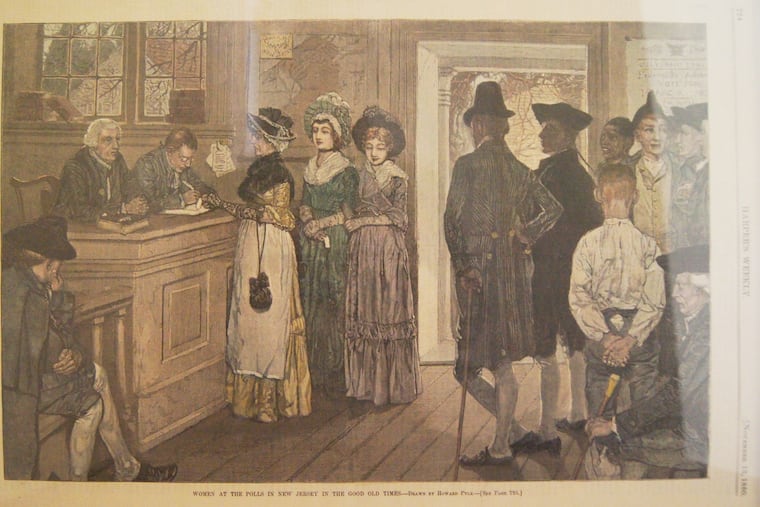Revolution Museum has a remarkable story to tell about New Jersey’s inclusive voting rights — in the 1700s
When the nation was brand new, both women and people of color could vote in New Jersey. Philly's Museum of the American Revolution is building an exhibit to tell that story, starting this summer.

We don’t know much about Sarah Vandike. Who she was and exactly where she lived, whom she loved and whom she lost and whom she prayed for — all has vanished in the distant past.
But one thing is certain, and it may be the most enduring fact about Sarah Vandike, a white New Jersey woman who lived in Montgomery Township in the late 1700s and early 1800s:
She voted.
In this year in which many institutions are commemorating the 100th anniversary of the 19th Amendment, which granted women the right to vote, the Museum of the American Revolution plans to highlight a long ago time in New Jersey when males and females, including people of color, could vote. And did.
“When Women Lost the Vote: A Revolutionary Story, 1776 — 1807” will open Aug. 22 and run through March 28, 2021.
Vandike was listed in the obscure 1801 Montgomery Township poll lists that museum curators discovered in researching the exhibition. To date, they’ve found names of 163 women at local institutions and state archives. Prior to this, little proof of women voting during this period was known to exist, museum officials said.
From 1776 in New Jersey, the year of American Independence and the boiling stew of egalitarian ideas it unleashed, until 1807, “all inhabitants of this colony," including women and people of color who fulfilled residency and age requirements and were “worth fifty pounds” could go to the New Jersey polls and "vote for Representatives in Council & Assembly; and also for all other publick Officers that shall be elected by the People of the County at Large,” according to the law.
It was right there in the state constitution of 1776. Then, in 1790, to clarify, the legislature reworded the law to say “he or she" could vote. No mistaking that voting was not limited by gender, and there was no limitation placed on free people of color, either.
Marcela Micucci, curatorial fellow in women’s history for the museum, went through archives across the state and discovered the hard evidence of women’s names written down in the poll lists.
“In this exhibition, we are reconstructing the long-forgotten stories of America’s first women voters and will explore how the next generation of suffragists stood on the shoulders of the women who first pioneered the vote,” she said.
Philip Mead, the museum’s chief historian and director of curatorial affairs, said that prior to Micucci’s discovery of women named on the poll lists, there had been little hard evidence of women at the New Jersey polls.
“There aren’t many poll lists that even survive,” he said.
Mead said that urban and rural areas “embraced and accepted” voting by blacks and women during the period of open voting.
But with the rise of partisan hostilities, particularly those that flared up around the nasty election of 1800 pitting John Adams against Thomas Jefferson, women and people of color were “increasingly scapegoated” amid charges of voting irregularities and fraud.
In 1807, the law was changed. Thereafter, only white propertied males were allowed to vote.
It was not a just a simple matter of propertied white men asserting control and shutting down women and blacks, Micucci said. Women voted according to different interests.
“Women were not voting as a bloc,” she said.
Following 1807, no woman cast a vote in New Jersey until passage of the 19th Amendment to the U.S. Constitution opened the doors of the polling places in 1920. Black men were re-enfranchised in the U.S. by the 15th Amendment, ratified in 1870; their sisters waited another 50 years.